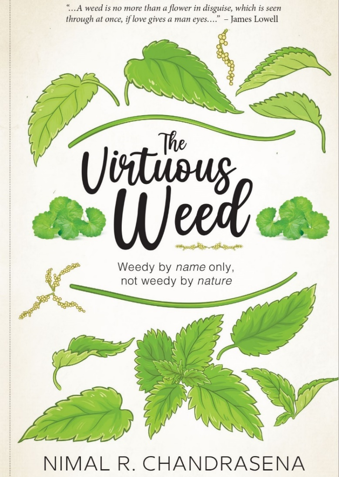WEEDY BY NAME ONLY, NOT WEEDY BY NATURE – By Nimal R. Chandrasena
“The Virtuous Weed” –
A new book from a Sri Lankan Weed Scientist
“A weed is no more than a flower in disguise, which is seen through at once if love gives a man eyes” – James Lowell
 Dr. Nimal Rohan Chandrasena, a former Associate Professor of Botany, at the University of Colombo, has just published his first book on weeds.
Dr. Nimal Rohan Chandrasena, a former Associate Professor of Botany, at the University of Colombo, has just published his first book on weeds.
He is the Editor-in-Chief of the journal WEEDS – the official journal of the Asian-Pacific Weed Science Society (http://apwss.org.in/).
Weeds, as a group of plants, are unloved by some people. However, this dislike is not universal. Weeds are colonizing, pioneering plants, with special botanical and ecological attributes that allow them to succeed in disturbed habitats.
They are a critical component of Mother Earth’s rich biodiversity. As frugal, thrifty and simple beings, which never ask for too much but give back more than they take, weeds are also Nature’s Gifts from which humans can learn many lessons.
Weeds also spotlight the mistakes man has made in managing our environmental assets by large-scale land-clearing, destruction of vegetation and soil resources, as well as unsustainable agricultural practices and urban developments.
Nimal Chandrasena’s book provides compelling evidence of the virtuous side of weeds and their utilization potential for people’s livelihoods and sustainable future societies.
According to reviewers, the book is not just a “garden of weeds”, it is an “orchard”, a “storehouse” of information that would enlighten general readers on the history of weeds and how to relate to them more effectively with understanding and empathy.
Weeds have special botanical and ecological attributes related to life cycles, growth habits, reproduction and dispersal that allow establishment in disturbed areas and then easily spread into new habitats.
From agricultural beginnings, now dating back to well over 12,000 years of man’s history, weeds have been our constant companions. They have followed us wherever humans went as shadows of men.
As phenomenally successful plants, weeds earned mankind’s wrath, almost as if humans are not able to psychologically cope with other successful and ‘pest-like’ species (for instance, the house fly, European rabbit, European fox, Indian mynah, and a host of others). Stories about weeds that are mostly written and read in popular media, including the internet, are mostly concocted to invoke fear and loathing, instead of a proper understanding.
Powerful and emotive phrases like “War-With-Weeds” are commonplace in weed discourses. In joining unwinnable ‘wars’ against weeds, the public is largely misinformed about weeds with only one side of the story. Some weed scientists and ecologists are also, unfortunately, in this camp.
Blaming weeds for human follies of mismanaging our fragile earth is common. Weeds are also called ‘the second greatest threat to biodiversity’ on the earth, a highly contentious viewpoint.
Author’s Viewpoints
“To understand weeds, being a botanist and ecologist, and an environmentally-literate person helps. I became a fully-fledged Weed Scientist in 1983, and over the past 40 years, I have had a lengthy career as an academic, public servant and consultant in dealing with some of the world’s greatest weeds”.
“Research and teaching taught me not to deride plant species by calling them ‘The World’s Worst Weeds’ as some are commonly referred to. Some of these species are, arguably, the ‘best-of-the-best’ with ecological attributes that can heal the planet and help humans and other animals survive looming uncertain times”.
The book will surely open a critical dialogue on weeds, across borders that separate divergent views. Can weeds be appreciated for their critical ecological roles? Can they be managed in situations where they may become problematic?
A change in basic assumptions to tolerate the extraordinarily resourceful weedy taxa (‘living with weeds’) appears prudent as plants and animals, as well as human societies, face uncertain times in a changing global climate. Human psychology is involved in our responses to weeds. In promoting the ‘virtuous’ side of weedy taxa, Dr. Chandrasena argues for a better understanding of weeds as part of Nature and ending unsustainable approaches, such as a ‘war-with-weeds’.
TESTIMONIALS
Nimal Chandrasena recognizes the wisdom of the last lines of the neglected words of Gerard M. Hopkins’ 1918 poem – Inversnaid.
What would the world be, once bereft,
Of wet and wildness?
O let them be left; wildness and wet;
Long live the weeds and the wilderness yet.
Hopkins and Nimal Chandrasena recognize the error of the mindset of many agricultural people, including many weed scientists – that weeds have no redeeming qualities and must be controlled at all costs.
Nimal says – Wait a minute. Consider whether your weed control views and over-reliance on herbicides may have harmed your science’s reputation. Does your scientific view conflict with the societal view of weedy plants?
Has it harmed your science’s reputation and its public image? Read Chandrasena’s book. It may convince you there are other ways to manage vegetation. It may not change your mind, but it will make you think.
Robert L. Zimdahl, Professor Emeritus, Colorado State University, USA
“An excellent effort by Dr. Nimal Chandrasena to bring out the virtuous aspects of the “fascinating World of Weeds” that may be explored by humanity for benefits. Utilization of Weeds is a must that should sit alongside the efforts to manage them where required. An important contribution to the Weed Science discipline.
Adusumilli Narayana Rao, General Secret
ary, Asian-Pacific Weed Science Society
“Nimal Chandrasena argues that a possible cause of the prevailing ‘weed illiteracy’ is the shallowness of the discourses on weeds in different countries. With more than 40 years of experience in weeds and their management, he has made a compelling case for ‘living with weeds’ for societal benefits. In the book, he sets out to allay the public’s fears: Weeds are not always unwelcome news. Indeed, not all the time. A delightful read, from someone who has already made significant contributions to Weedy discourses”.
N. T. Yaduraju, Former Director, ICAR – Directorate of Weed Research, Jabalpur
“The Virtuous Weed is a welcome addition to the literature on Colonizing species. In a field crowded with predictably repetitive, “me, too!” declarations of fear and loathing, Nimal Chandrasena thinks for himself, and his thoughts are worth attending to”.
Matthew K Chew, Associate Professor, Arizona State University, USA

http://www.vividpublishing.com.au/thevirtuousweed/
It is priced at Aus $ 32.95 + $ 9.95 (P&P).
If anyone wants to contact the Author regarding purchasing the book and having it delivered, please contact Nimal directly:
Mobile: +61-408 279 604
The Author
Nimal Chandrasena, a Weed Scientist, was the first Associate Professor of Botany (by Merit) at the University of Colombo, Sri Lanka. He is the Editor-in-Chief of the Journal WEEDS (Asian-Pacific Weed Science Society).
Nimal obtained his Ph.D. in Weed Science from the University of North Wales (Bangor, UK). He lives and works in Australia and is a well-published scholar. His 40-plus years of experience, as a Botanist and Ecologist, “mingling with weeds”, shines a light on the group of plants, branded ‘weeds’, which some people dislike.
Nimal has been a long-time campaigner for the utilization of these maligned plants for societal benefits. Instead of being disrespectful to weeds, Nimal makes a plea to understand weeds better and treat them as ‘Nature’s Gifts’. He also argues for a change in thinking in Weed Science to start “Living With Weeds”.
Author’s Note For Sri Lankan expatriates –
Please be aware that if you purchase the book, the Author assures that the proceeds of the book, written out of love and admiration for weedy species, will be used for charitable purposes only, in which the author and others are involved (i.e. Arunodaya Foundation, which is helping Sri Lanka’s disadvantaged).
Details on Arunodaya Foundation’s charitable activities can be obtained by contacting the Author directly.







